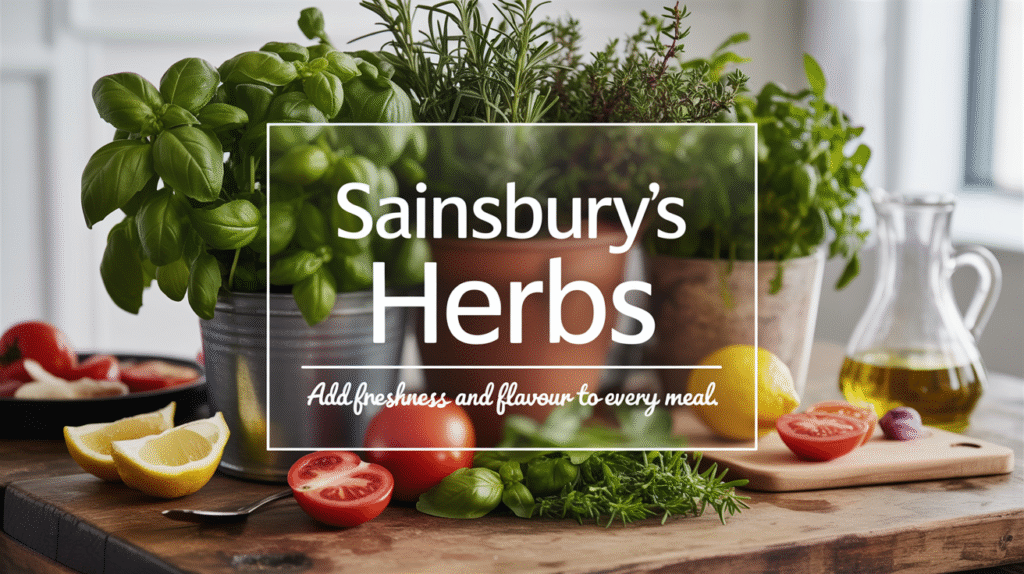Sainsbury’s Herbs are an essential addition to any kitchen, offering aromatic freshness and depth to both everyday and gourmet dishes. Whether dried or fresh, these herbs elevate your cooking by enhancing flavour, balancing spices, and even contributing nutritional value. Their affordability, range, and convenience make them a trusted choice for home cooks across the UK.

Types of Sainsbury’s Herbs and Their Culinary Uses
Sainsbury’s offers a comprehensive selection of herbs to suit a variety of recipes and cooking styles. Understanding the unique profile of each helps maximise flavour in your dishes.
Dried Herbs
Dried herbs are long-lasting and ideal for cooking dishes with longer preparation times.
- Dried oregano and thyme are great for stews, sauces, and roasts.
- Dried basil and parsley can be used in pasta dishes, soups, and salad dressings.
Fresh Herbs
Fresh herbs offer bright, clean flavours perfect for finishing or garnishing meals.
- Fresh coriander is commonly used in curries, rice dishes, and salsas.
- Fresh basil is excellent for tomato-based sauces, pesto, and Italian salads.
Blended Herb Mixes
Sainsbury’s also sells herb blends like Italian seasoning and bouquet garni.
- Blends simplify seasoning and help balance dishes quickly.
- Ideal for slow-cooked meals, soups, and roasted meats.
Why Choose Sainsbury’s Herbs?
Sainsbury’s herbs are popular for their consistent quality, freshness, and ease of access.
Trusted Sourcing and Quality
Each herb is carefully sourced and processed to retain flavour and aroma.
- Dried herbs are air-dried and packaged to preserve potency.
- Fresh herbs are regularly restocked for optimal freshness.
Convenient Packaging
Herbs are offered in resealable pouches or small glass jars that preserve quality.
- Easy to store and stack in cupboards or spice racks.
- Clear labelling helps identify each herb at a glance.
The Benefits of Cooking with Herbs
In addition to enhancing flavour, herbs offer a range of health benefits and visual appeal.
Adds Natural Flavour Without Calories
Herbs boost taste without the need for salt, sugar, or fat.
- Ideal for those reducing sodium intake.
- Brings complexity to low-fat meals and soups.
Contributes Nutritional Value
Many herbs are rich in antioxidants and vitamins.
- Parsley contains vitamin C and iron.
- Thyme and rosemary have antimicrobial properties.
How to Cook with Sainsbury’s Herbs Effectively
Knowing when and how to add herbs can drastically improve your cooking results.
Add Dried Herbs Early
Dried herbs benefit from cooking time to release their flavours.
- Add during the sautéing stage in stews, casseroles, or sauces.
- Ideal for dry rubs, marinades, and slow cooker meals.
Use Fresh Herbs at the End
Fresh herbs lose flavour when overcooked, so add them at the end.
- Sprinkle chopped herbs over dishes just before serving.
- Use fresh herbs in salads, dressings, and dips for brightness.
Proper Storage Tips for Herbs
Maintaining herb quality requires correct storage, especially with fresh varieties.
Dried Herbs
Keep dried herbs in a cool, dark cupboard in airtight containers.
- Avoid moisture exposure to prevent clumping or mould.
- Replace every 6–12 months for optimal potency.
Fresh Herbs
Refrigeration is key to keeping herbs crisp and aromatic.
- Wrap in damp paper towel and store in a plastic bag.
- Basil should be kept at room temperature in a glass of water.
Popular Sainsbury’s Herbs and Their Recipe Matches
Knowing which herb suits what dish helps you use them more confidently.
Rosemary
Robust and woody, perfect for roasted lamb, potatoes, and focaccia.
- Holds up well during roasting.
- Ideal in infused oils and bread doughs.
Thyme
Versatile and fragrant, thyme suits stews, soups, and poultry.
- Pairs well with lemon, garlic, and wine-based sauces.
- Dried thyme is especially good for long simmers.
Oregano
Common in Mediterranean and Mexican cooking.
- Great in tomato sauces, pizza, and grilled vegetables.
- Blends well with chilli flakes and garlic.
Parsley
Fresh and grassy, parsley balances strong flavours.
- Use in tabbouleh, chimichurri, or as a finishing garnish.
- Adds visual appeal and lightness to heavy dishes.
FAQs
Here are some questions and answers about Sainsbury’s Herbs.
What’s the difference between fresh and dried herbs?
Fresh herbs offer a brighter, more delicate flavour and are best added at the end of cooking. Dried herbs are more concentrated and suited for longer cooking times.
Can I substitute dried herbs for fresh ones?
Yes, use about one-third the amount of dried herbs when substituting for fresh. For example, 1 tablespoon fresh = 1 teaspoon dried.
How long do dried herbs last?
Dried herbs generally remain potent for 6 to 12 months. Store them in airtight containers away from heat and light.
Are Sainsbury’s herbs organic?
Some varieties, particularly fresh herbs, are available in organic options. Look for the organic label on the packaging.
How can I keep fresh herbs from spoiling?
Wrap them in a damp paper towel and store in a resealable bag in the fridge, or place stems in water like a bouquet and cover loosely with a plastic bag.
Sainsbury’s Herbs bring freshness, balance, and a health boost to your cooking. With options for every dish and season, they help turn simple ingredients into extraordinary meals, whether you’re cooking from scratch or adding a final flourish.
